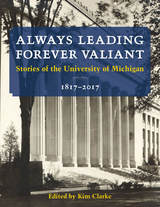

Blue Ice relates the tale of the University of Michigan's hockey program--from its fight to become a varsity sport in the 1920s to its 1996 and 1998 NCAA national championships.
This history of the hockey program profiles the personalities who shaped the program--athletic directors, coaches, and players. From Fielding Yost, who made the decision to build the team a rink with artificial ice before the Depression (which ensured hockey would be played during those lean years), to coaches Joseph Barss, who survived World War I and the ghastly Halifax explosion before becoming the program's first coach, to Red Berenson, who struggled to return his alma mater's hockey team to prominence in the 1980s and 1990s. Players from Eddie Kahn, who scored Michigan's first goal in 1923, to Brendan Morrison, who upon winning the 1996 national championship with his goal said, "This is for all the [Michigan] guys who never had a chance to win it."
Blue Ice also explores the players' exotic backgrounds, from Calumet in the Upper Peninsula to Minnesota's Iron Range to Regina, Saskatchewan; how coach Vic Heygliger launched the NCAA tournament at the glamorous Broadmoor Hotel; and how commissioner Bill Beagan transformed the country's premier hockey conference.
In Blue Ice, fans of hockey will learn the stories behind the curse of the Boston University Terriers, the hockey team's use of the winged helmet, and the unlikely success of Ann Arbor's home-grown talent.
Unlike other sports at the collegiate level, the hockey players at Michigan haven't been motivated by fame or fortune; rather, they came to Michigan get an education and to play the game they loved.
John U. Bacon has won numerous national writing awards and now freelances for Sports Illustrated,Time,ESPN Magazine,and the New York Times, among others.
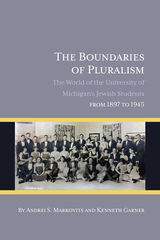
Raoul Wallenberg Distinguished University Professor of History,
University of Michigan
Arthur F. Thurnau Professor, University of Michigan,
and Director, Bentley Historical Library

Galvanized by their shared experiences with sex discrimination, the Ann Arbor women organized a group called FOCUS on Equal Employment for Women, led by activist Jean Ledwith King. Working with Bernice Sandler of the Women’s Equity Action League, they developed a strategy to unleash the power of another powerful institution—the federal government—to demand change at U-M and, they hoped, across the world of higher education. Prompted by a complaint filed by FOCUS, the U.S. Department of Health, Education, and Welfare soon documented egregious examples of discrimination in Michigan’s practices toward women and threatened to withhold millions of dollars in contracts unless the school adopted remedies. Among the hundreds of similar complaints filed against U.S. colleges in 1970–1971, the one brought by the Michigan women achieved the breakthrough that provided the historic template for settlements with other institutions.
Drawing on oral histories from archives as well as new interviews with living participants, Conquering Heroines chronicles this pivotal period in the histories of the University of Michigan and the women’s movement. An incredible story of grassroots activism and courageous women, the book highlights the kind of relentless effort that has helped make inclusivity an ongoing goal at U-M.
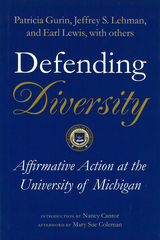
Even as lawsuits challenging its admissions policies made their way through the courts, the University of Michigan carried the torch for affirmative action in higher education.
In June 2003, the Supreme Court vindicated UM's position on affirmative action when it ruled that race may be used as a factor for universities in their admissions programs, thus confirming what the UM had argued all along: diversity in the classroom translates to a beneficial and wide-ranging social value. With the green light given to the law school's admissions policies, Defending Diversity validates the positive benefits gained by students in a diverse educational setting.
Written by prominent University of Michigan faculty, Defending Diversity is a timely response to the court's ruling. Providing factual background, historical setting, and the psychosocial implications of affirmative action, the book illuminates the many benefits of a diverse higher educational setting -- including preparing students to be full participants in a pluralistic democracy -- and demonstrates why affirmative action is necessary to achieve that diversity.
Defending Diversity is a significant contribution to the ongoing discussion on affirmative action in higher education. Perhaps more important, it is a valuable record of the history, events, arguments, and issues surrounding the original lawsuits and the Supreme Court's subsequent ruling, and helps reclaim the debate from those forces opposed to affirmative action.
Patricia Gurin is Professor Emerita, Department of Psychology, University of Michigan. Jeffrey S. Lehman, former Dean of the University of Michigan Law School, is President of Cornell University. Earl Lewis is Dean of Rackham Graduate School, University of Michigan.

Dutch is Beautiful tells the story of the fifty years of Dutch and Flemish Studies at the University of Michigan in Ann Arbor, Michigan, USA. It is an account of the efforts to promote Dutch and Flemish culture and language, as well as a description of how the teaching of Dutch language, literature, history and culture can be a tool to look at a world of diverse identities. It also offers a comprehensive overview of the beginnings of a successful program that included Dutch writers-in-residence, visiting Netherlands professors, cultural and educational events, arts, music, films, conferences and publications. Several alumni of the program look back at their college years with appreciation. Articles and essays on history, Anne Frank, and conversations on colonialism discuss critical and educational views on Dutch and Flemish Studies in past, present and future, when diversity, equity and inclusion are important goals and objectives, and public scholarship and academic activism will be a larger part of the curriculum. This book will inform, entertain, stimulate and impress everyone who is interested in the culture of the Low Countries. The title says it all!
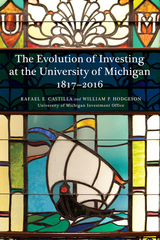


The study analyzes Hillel's challenges as a big-tent, catch-all institution trying to represent all Jewish students on campus regardless of their religious orientation, cultural preferences, and ideological predilections. It looks at Hillel's interactions with the then powerful Jewish fraternities and sororities that provided the main locus of Jewish life on campus at the time, as well as its relations with the University's leadership and many of its cultural and political constituencies. Most of these activities occurred at a time when anti-Semitism was rife in the United States, particularly in the larger Detroit area, home to Henry Ford and Father Charles Edward Coughlin.

Search and browse the Bentley Historical Library's Michigan Daily Archive, https://digital.bentley.umich.edu/midaily. The free online archive contains stories from 23,000 issues published between 1891 and 2014.
--John U. Bacon, bestselling author of Three and Out: Rich Rodriguez and the Michigan Wolverines in the Crucible of College Football and Endzone: The Rise, Fall, and Return of Michigan Football
—Mary Sue Coleman, President Emerita at the University of Michigan
—James J. Duderstadt, President Emeritus at the University of Michigan
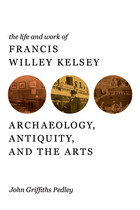
President of the Archaeological Institute of America, professor at the University of Michigan from 1889 to 1927, and president of the American Philological Association, Francis Kelsey was crucially involved in the founding or growth of major educational institutions. He came to maturity in a period of great technological change in communications, transportation, and manufacturing. Kelsey took full advantage of such innovations in his ceaseless drive to promote education for all, to further the expansion of knowledge, and to champion the benefits of the study of antiquity.
A vigorous traveler around the United States, Europe, and the Mediterranean, Kelsey strongly believed in the value of personally viewing sites ancient and modern and collecting artifacts that could be used by the new museums and universities that were springing up in the United States. This collecting habit put him in touch with major financiers of the day, including Charles Freer, Andrew Carnegie, and J. P. Morgan, as he sought their help for important projects.
Drawing heavily on Kelsey's daily diaries now held at the University of Michigan's Bentley Historical Library, John Griffiths Pedley gives us a biography that records the wide-ranging activities of a gifted and energetic scholar whose achievements mirrored the creative and contributive innovations of his contemporary Americans.
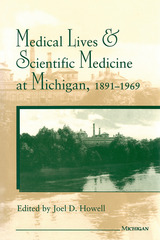
U.S. health care has changed dramatically during the past century. A new breed of physicians use new machines, vaccines, and ideas in ways that have touched the lives of virtually everyone. How and why did these changes occur?
The biographical essays comprising this volume address this question through the stories of six scientific innovators at the University of Michigan Medical School. Michigan was the first major U.S. medical school to admit women, to run its own university hospital, and, by the turn of the century, was recognized as one of the finest medical schools in the country. The people whose stories unfold here played a central part in defining the place of medical science at the University of Michigan and in the larger world of U.S. health care.
Introductory sections are followed by biographical profiles of George Dock, Thomas Francis, Albion Hewlett, Louise Newburgh, Cyrus Strurgis, and Frank Wilson. Drawing on extensive archival research, the authors provide a richly textured portrait of academic medical life and reveal how the internal content of science and medicine interacted with the social context of each subject's life. Also explored is the relationship between the environment (the hospital, the university, and the city) and the search for knowledge.
These narratives expand our perspective on twentieth-century medical history by presenting these individuals' experiences as extended biopsies of the period and place, focal points illuminating the personal nature of medicine and locating the discipline within a social and institutional setting.
Joel D. Howell is Associate Professor, Department of Internal Medicine, Department of History, and Department of Health Services Management and Policy, University of Michigan.
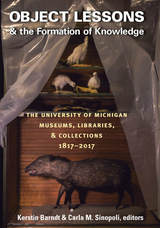
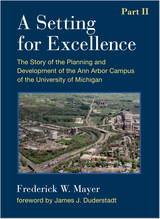
By tracing the development of the Ann Arbor campus from its early days to the present, within the context of the evolution of higher education in America, Mayer provides a strong argument for the importance of rigorous and enlightened campus planning as a critical element of the learning environment of the university. His comprehensive history of campus planning, illustrated with photos, maps, and diagrams from Michigan’s history, is an outstanding contribution to the university’s history as it approaches its bicentennial.

By tracing the development of the Michigan campus from its early days to the present, within the context of the evolution of higher education in America, Mayer provides a strong argument for the importance of rigorous and enlightened campus planning as a critical element of the learning environment of the university. His comprehensive history of campus planning, illustrated with photos, maps, and diagrams from Michigan’s history, is an outstanding contribution to the university’s history as it approaches its bicentennial in 2017. Perhaps more important, Mayer’s book provides a valuable treatise on the evolution of campus planning as an architectural discipline.
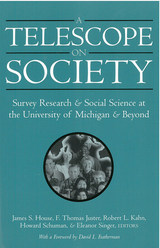
The chapters of this volume illustrate the impact that developments in survey research have had and continue to have on a broad range of social science disciplines and interdisciplinary areas ranging from political behavior and electoral systems to macroeconomics and individual income dynamics, mental and physical health, human development and aging, and racial/ethnic diversity and relationships.
The volume will speak to a wide audience of social science and survey research professionals and students interested in learning more about the broad history of survey-based social science and its contributions to understanding ourselves as social beings. It also seeks to convey how crucial institutional and public support are to the development of social science and survey research, as they have been to development in the natural, biomedical, and life sciences.
The five editors of this book are longtime research professors and colleagues in the Survey Research Center of the Institute for Social Research at the University of Michigan. James S. House is also Professor in the Department of Sociology; F. Thomas Juster is Professor Emeritus in the Department of Economics; Robert L. Kahn is Professor Emeritus in the Department of Psychology and Department of Health Management and Policy; and Howard Schuman is Professor Emeritus in the Department of Sociology; Eleanor Singer is Research Professor in the Survey Research Center, all at the University of Michigan. Professors House (1991-2001), Kahn (1970-76), and Schuman (1982-90) have each served as Director of the Survey Research Center; Professor Juster served (1976-86) as Director of the Institute for Social Research; and Professor Singer served (1999-2002) as Associate Director of the Survey Research Center.
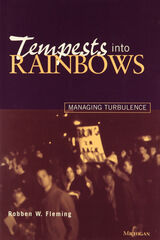
Robben W. Fleming was President of the University of Michigan during the turmoil of the Vietnam era. He brought a clear and effective philosophy to the challenges he faced as manager and leader in a turbulent time. Fleming recounts the dramatic confrontations and demonstrations at Michigan over the war in Vietnam, military research in universities, the investment of university endowment funds in South African enterprises, and black student campaigns for improved conditions on campus.
Robben W. Fleming has much to teach. There are lessons for all who face the challenges of leadership in this lively and readable autobiography of one who has displayed grace, style and effectiveness in difficult and sometimes threatening situations. Tempests into Rainbows also explores the influences on his life that nurtured his exceptional ability to create agreement and to solve conflict.
The story of his formative years is filled with both humor and pathos. Fleming writes about local personalities, the deaths of his "twin" brother and father, and the difficulties of the family during the economic recession of the 1920s and 1930s. Academic and athletic prowess enabled him to put himself through college and law school, emerging just in time to serve as a military government officer with troops in North Africa and Europe.
After World War II, Fleming became a specialist in labor-management relations, teaching at the University of Illinois and serving as a professional mediator and arbitrator of labor disputes. Then in 1964 he became Chancellor of the University of Wisconsin in Madison, and later President of the University of Michigan until 1979. Although he remains active as a consultant deploying his mediation skills, his last career position was as President of the Corporation for Public Broadcasting.
This unusual autobiography, appealing in its honesty and in the original story it has to tell, is also instructive in showing how a thoughtful person with a humane, consistent philosophy can manage when chaos and turmoil threaten. It will thus appeal not only to those who knew Fleming and who have ties to the universities in which he served, but also to all who manage and study the management of complex institutions.
"Robben Fleming has written a fascinating memoir, especially his intensely personal account of the trials and terrors that faced this university president as Ann Arbor's student body--and he came to grips with the civil rights revolution and the Vietnam War."
---Mike Wallace
"To relive Robben Fleming's life is to relive an American epoch. There was a time when America was at war with its enemies, and a time when America was at war with itself. He writes perceptively from both battlegrounds."
---Daniel Schorr
"Robben Fleming is a giant--a creative and imaginative leader of exceptional talent. All of us can learn from the lessons of his life. His book is a treasure."
---Newton N. Minow
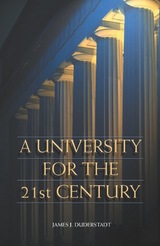
Change has always characterized the university as it has sought to preserve and propagate the intellectual achievements, the cultures, and the values of our civilization. However, the capacity of the university to change, through a process characterized by reflection, reaction, and consensus, simply may not be sufficient to allow the university to control its own destiny. Not only will social and technical change be a challenge to the American university, Duderstadt says, it will be the watchword for the years ahead. And with change will come unprecedented opportunities for those universities with the vision, the wisdom, and the courage to lead in the twenty-first century. The real question raised by this book is not whether higher education will be transformed, but rather how . . . and by whom.
James J. Duderstadt is President Emeritus and University Professor of Science and Engineering, University of Michigan.
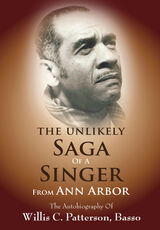
The book’s main character begins his life, similar to a diamond in the rough, and over time evolves into a rare gem at maturity. These pages will reveal how Willis Patterson of Ann Arbor, Michigan developed from somewhat of a lost child in the 1930s into a: sophisticated academician (Ph.D. in Higher Education Administration and Supervision from Wayne State University in Detroit, MI); a superior vocal performer; Voice Department Chair, Fulbright Scholar; esteemed Master Voice Teacher; Choral and Glee Club director extraordinaire; University Leader in the recruitment and retention of Minority students (Voice/Performing/Composition); an established Church Choir Director; and Associate Academic Dean of the School of Music at one of America’s finest universities, the University of Michigan.
This book is about a very humble man of significant stature. Although he was motivated and driven to become the best he could be in his quest for excellence—by kicking open the door of opportunity whenever it was presented (audition ready)—he never forgot his family members or hometown acquaintances.
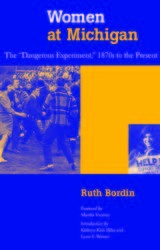
READERS
Browse our collection.
PUBLISHERS
See BiblioVault's publisher services.
STUDENT SERVICES
Files for college accessibility offices.
UChicago Accessibility Resources
home | accessibility | search | about | contact us
BiblioVault ® 2001 - 2024
The University of Chicago Press









